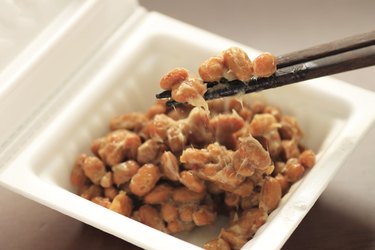
Made from cooked soybeans fermented with the Bacillus natto bacteria, natto is a powerhouse of nutrition. Each 1-cup serving is high in protein, fiber, antioxidant phytochemicals and essential vitamins and minerals like iron, selenium, vitamin C and vitamin K. However, eating more than a few servings of natto a day might cause harmful side effects in some people. Talk to your doctor if you're concerned that your natto consumption exceeds what's healthy for you.
May Contribute to Weight Gain
Video of the Day
Natto is not a low-calorie food. At 371 calories per cup, a person on a 2,000-calorie diet would obtain over 18 percent of his daily needs from eating one serving of natto; 2 cups a day would supply approximately 37 percent. Unless you control the calorie content of the rest of your day's food, you might consume more calories than you burn, gain weight and have a higher risk of weight-related health problems such as Type 2 diabetes, hypertension, stroke and some types of cancer.
Video of the Day
Could Increase Heart Disease Risk
According to the American Heart Association, healthy adults should limit their saturated fat consumption to no more than 7 percent of their calories -- less than 16 grams daily -- and should get most of the fat in their diet from mono- and polyunsaturated sources. Although natto is rich in heart-healthy fats, it also contains about 3 grams of saturated fat per cup. An individual whose eating habits include large amounts of natto and other foods high in saturated fat, such as red meat or full-fat dairy, may consume more saturated fat than is recommended and be more likely to develop heart disease.
Might Exceed Protein Recommendation
Every cup of natto contains around 31 grams of protein. That's 55 percent of the average man's recommended dietary allowance and over 67 percent of the average woman's. Two cups of natto would exceed the RDA for both. Eating too much natto -- and thereby more protein than your body needs -- may make you more likely to develop osteoporosis, kidney disease and kidney stones, says the Physicians Committee for Responsible Medicine. You're not likely to develop serious symptoms unless you're far exceeding your recommended daily protein intake, but taking in more than the daily protein allowance won't offer any benefits over just meeting your needs, either.
Can Interfere With Proper Blood Clotting
Natto contains an enzyme known as nattokinase. A study published in Nutrition Research in 2009 demonstrated that nattokinase lowers the bloodstream's level of the three blood-clotting proteins fibrinogen, factor VII and factor VIII. While this can thin the blood and may prevent heart attack and stroke, high nattokinase consumption might increase the risk of excessive bleeding in people who are already taking blood-thinning medications or who have coagulation disorders. The scientists used nattokinase supplements in their research, but it's not known how much natto a person on blood thinners can eat without experiencing side effects. If you're on these medications, consult your doctor before eating natto.
- Soy Info Center: History of Natto and Its Relatives
- USDA National Nutrient Database: Natto
- American Heart Association: Know Your Fats
- Centers for Disease Control and Prevention: Protein
- Physicians Committee for Responsible Medicine: The Protein Myth
- Nutrition Research: Nattokinase Decreases Plasma Levels of Fibrinogen, Factor VII and Factor VIII in Human Subjects